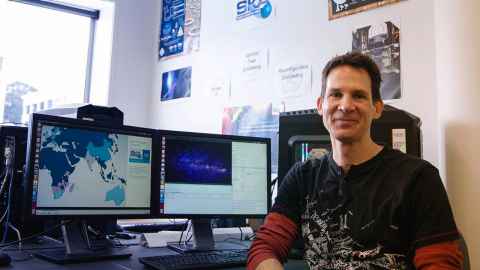Doctoral study in Electrical and Electronic Engineering
Why study with us?
- The highest-ranked Engineering faculty in New Zealand and 107th in the world (QS World University Rankings by Subject, 2025)1
- Opportunities to be supervised by experts in the field, such as pioneers in Wireless Power Transfer and world-class collaborators at the Centre for Automation and Robotic Engineering Sciences
- Connections to professional, industry and research organisations, such as the Institute of Electrical and Electronics Engineers and the Association of Computing Machinery
- Access to Postgraduate Research Student Support (PReSS) funding for research expenses
1 QS World University Rankings for Engineering and Technology 2025
Research opportunities
Pursuing a PhD at our University gives you access to a high-calibre research community – you may have the opportunity to publish papers, attend international conferences and develop your network in academia and industry.
We welcome research proposals in topics relating to our key areas, including:
- Control systems, with wide applications such as modelling and control of bioprocesses, modelling and control of water treatment plants, Bit Stream implementation of controllers, nonlinear filtering design, and active fault-tolerant control of stochastic nonlinear dynamical systems
- Power electronics, with research focused on innovative technologies such as wireless charging of Electric Vehicles or mobile electronics, as well as green energy and biomedical applications
- Power systems, especially issues related to modern electrical power systems, from the integration of renewable energy, to electricity grids
- Electricity and society, with emphasis on electricity protection, economics (demand side participation, ancillary services, or volatility of), or innovation (smart grids, storage, or large-scale Electric Vehicle integration)
- Signal processing, which aligns with our expertise in the acoustics of audio and speech, biometric analysis, hyperspectral processing, image processing, speech processing, speech recognition, and speech synthesis
- Telecommunications and electromagnetics, in areas such as high-performance indoor wireless system design, wireless communications, wireless sensor networks and localisation, radio system design and optimisation, computational electromagnetics, antennas, and microwave/millimetre wave communication
Our people

Professor Oliver Sinnen
Professor Oliver Sinnen’s research is situated in the area of parallel computing and programming, where he follows different subfields: development and analysis of scheduling algorithms for parallel systems; reconfigurable computing and acceleration with FPGAs; and software engineering for parallel programming. He leads a team at the University that is contributing to the development of the Square Kilometre Array (SKA), which will be the world's largest radio telescope when completed.
More researchers in Electrical and Electronic Engineering:
- Professor Abhisek Ukil
- Associate Professor Akshya Swain
- Dr Bernard Guillemin
- Professor Catherine Watson
- Dr Dariusz Kacprzak
- Associate Professor Duleepa Thrimawithana
- Professor Gerard Rowe
- Professor Grant Covic
- Professor Kevin Sowerby
- Dr Mark Andrews
- Dr Michael Neve
- Professor Patrick Hu
- Professor Nirmal Nair
- Dr Nitish Patel
- Professor Sing Kiong Nguang
- Associate Professor Stevan Berber
- Professor Udaya Madawala
- Associate Professor Waleed Abdulla
Past research topics
- Energy efficiency and power quality: a view from the technology and policy perspective | Supervised by Dr Nitish Patel and Associate Professor Nirmal Nair
- Energy efficient cooperative communication in wireless sensor networks subject to frequency-selective fading | Supervised by Associate Professor Stevan Berber and Professor Gerard Rowe
- A social realist case study of knowledge and pedagogy in the first two years of electrical engineering education | Supervised by Professor Gerard Rowe and Dr Claire Donald
- Speech enhancement methods based on CASA incorporating spectral correlation | Supervised by Associate Professor Waleed Abdulla and Associate Professor Akshya Swain
- Honey botanical origin classification using hyperspectral imaging and machine learning | Supervised by Associate Professor Waleed Abdulla and Professor Zoran Salcic
- Wireless power-enabled ultra-energy efficient bi-stable actuator for microfluidics | Supervised by Professor Patrick Hu and Professor Zoran Salcic
- Power repeaters for Inductive Power Transfer | Supervised by Professor Patrick Hu and Professor Sing Kiong Nguang
- Compressive Hyperspectral Imaging: Acquisition, recovery, and unmixing | Supervised by Dr Mark Andrews and Associate Professor Catherine Watson
- Eliciting and analysing perceptions of prosodic prominence: a Māori case study | Supervised by Associate Professor Catherine Watson and Dr Areta Helen Charters
Scholarships and awards
There are several scholarships you may be eligible for when you decide to pursue your PhD in Electrical and Electronic Engineering, including the University of Auckland Doctoral Scholarships.
Help and advice
For general student enquiries, please contact a Student Hub.
If you would like to find out more about studying Electrical and Electronic Engineering, you can contact a Postgraduate Adviser.